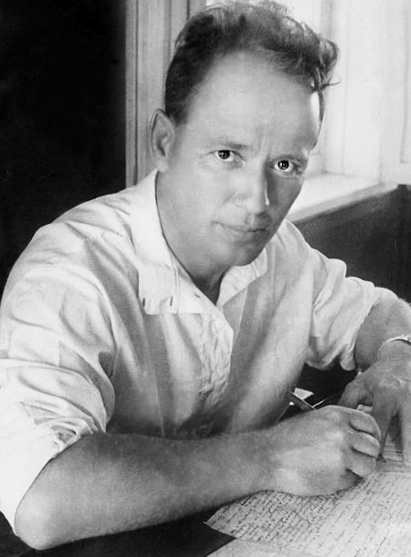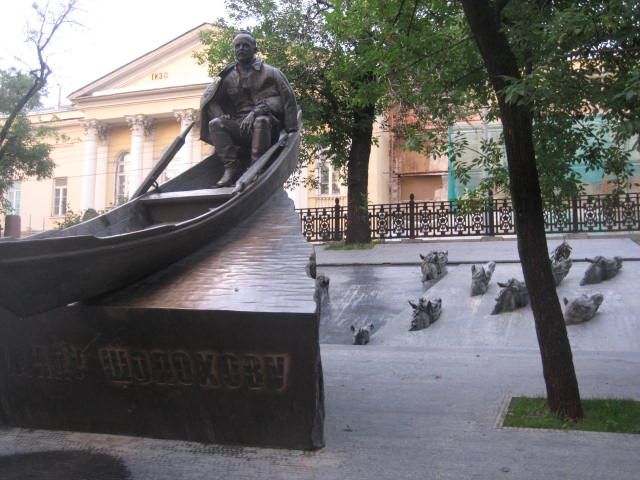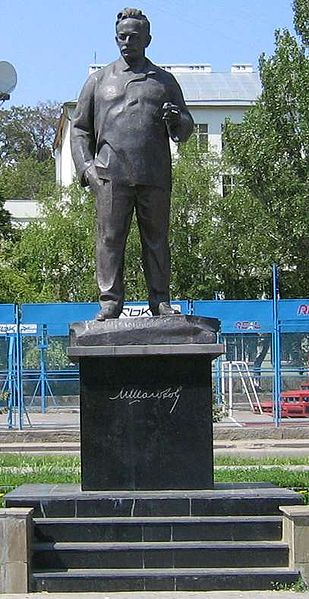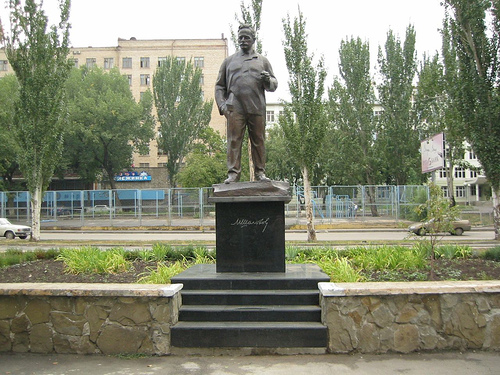<Back to Index>
- Industrial Psychologist Lillian Moller Gilbreth, 1878
- Writer Mikhail Aleksandrovich Sholokhov, 1905
- General of the Roman Empire Germanicus Julius Caesar, 15 B.C.
PAGE SPONSOR

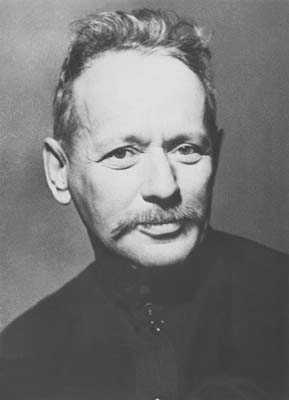
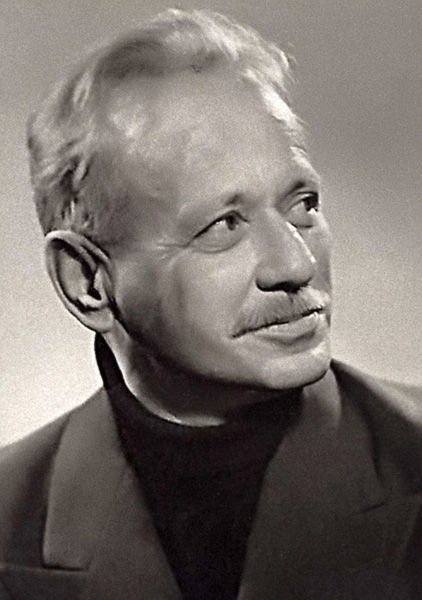
Mikhail Aleksandrovich Sholokhov (Russian: Михаи́л Алекса́ндрович Шо́лохов) (May 24 [O.S. May 11] 1905 – February 21, 1984) was a Soviet / Russian novelist and winner of the 1965 Nobel Prize in Literature. An asteroid in main - belt is named after him, 2448 Sholokhov.
Sholokhov was born in Russia, in the "land of the Cossacks" - the Kruzhlinin hamlet, part of stanitsa Veshenskaya, in the former Administrative Region of the Don Cossack Army. His father, Aleksander Mikhailovich (1865 – 1925), was a member of the lower middle class, at times a farmer, cattle trader, and miller. Sholokhov's mother, Anastasia Danilovna Chernikova (1871 – 1942), the widow of a Cossack, came from Ukrainian peasant stock (her father was a peasant in the Chernihiv oblast). She did not become literate until a point in her life when she wanted to correspond with her son.
Sholokhov attended schools in Kargin, Moscow, Boguchar, and Veshenskaya until 1918, when he joined the bolsheviki side in the Russian civil war at the tender age of 13. He spent the next few years fighting in the civil war.
Sholokhov began writing at 17. He completed his first literary work, the short story, The Birthmark, at 19.
In 1922 Sholokhov moved to Moscow to become a journalist, but he had to support himself through manual labour. He was a stevedore, stonemason, and accountant from 1922 to 1924, but he also intermittently participated in writers' "seminars". His first published work was a satirical article, The Test (Oct. 19, 1923).
In 1924 Sholokhov returned to Veshenskaya and devoted himself entirely to writing. In the same year he married Maria Petrovna Gromoslavskaia, the daughter of Pyotr Gromoslavsky, the ataman of the Bukanovskaya stanitsa; they had two daughters and two sons.
His first book Tales from the Don, a volume of stories about his native region during World War I and the Russian Civil War, largely based on his personal experiences, was published in 1926. The story "Nakhalyonok", partially based on his own childhood, was later made into a popular film.
In the same year Sholokhov began writing And Quiet Flows the Don which earned the Stalin Prize and
took him fourteen years to complete (1926 – 1940). It became the
most read work of Soviet fiction and was heralded as a powerful example
of socialist realism, and it earned him the 1965 Nobel Prize in Literature. It deals with the experiences of the Cossacks before and during World War Iand the Russian Civil War.
Virgin Soil Upturned, which earned the Lenin Prize, took 28 years to complete. It was composed of two parts: Seeds of Tomorrow (1932) and Harvest on the Don (1960), and reflects life during collectivization in the Don area.
The short story The Fate of a Man (1957) was made into a popular Russian film.
His unfinished novel, They Fought for Their Country is about World War II fighting in the USSR (in Russia the Soviet - German war during World War II is commonly referred to as the Great Patriotic War). In the 1930s he wrote several letters to Joseph Stalin about the appalling conditions in the kolkhozes and sovkhozes along the Don, requesting assistance for the farmers. During World War II Sholokhov
wrote about the Soviet war efforts for various journals. He also
covered the devastation caused by Nazi troops along the Don. His mother
was killed when Veshenskaya was bombed in 1942. Sholokhov's collected works were published in eight volumes between 1956 and 1960. Sholokhov was accused of plagiarizing And Quiet Flows the Don, which made his international reputation. Sholokhov's detractors claimed that it was written by Fyodor Kryukov, a Cossack and Anti - Bolshevik, who died in 1920. The
claimed evidence was circumstantial: Sholokhov's age at the time of its
composition and, in particular, the alleged gulf in quality between his
masterpiece and his other works. However,
an investigation in the late 1920s upheld Sholokhov's authorship of
"Quiet Don" and the allegations were denounced as malicious slander.
The allegations resurfaced in the 1960s with Aleksandr Solzhenitsyn as a notable proponent, possibly in retaliation for Sholokhov's scathing opinion of Solzhenitsin's novella One Day in the Life of Ivan Denisovich. A 1984 monograph by Geir Kjetsaa and others demonstrated through statistical analyses that Sholokhov was indeed the likely author of Don.
And in 1987, several thousand pages of notes and drafts of the work
were discovered and authenticated, including chapters excluded from the
final draft. During
the Second World War, Sholokhov's archive was destroyed in a bomb raid,
and only the fourth volume survived. Sholokhov had his friend Vassily
Kudashov, who was killed in the war, look after it. Following
Kudashov's death, his widow took possession of the manuscript, but she
never disclosed the fact of owning it. The manuscript was finally found by the Institute of World Literature of the Russian Academy of Sciences in 1999 with assistance from the Russian Government. An
analysis of the novel has unambiguously proved Sholokhov's authorship.
The writing paper dates back to the 1920s: 605 pages are in Sholokhov's
own hand, and 285 are transcribed by his wife Maria and sisters.
Sholokhov joined the
CPSU in 1932, and in 1937 he was elected to the Supreme Soviet of the Soviet Union. In 1959 he accompanied Soviet Premier Nikita Khrushchev on a trip to Europe and the United States. He became a member of the CPSU Central Committee in 1961, Academician of the USSR Academy of Sciences in 1939, and was a member of the USSR Supreme Soviet. He was twice awarded Hero of Socialist Labor, and later became vice president of the Association of Soviet Writers.
